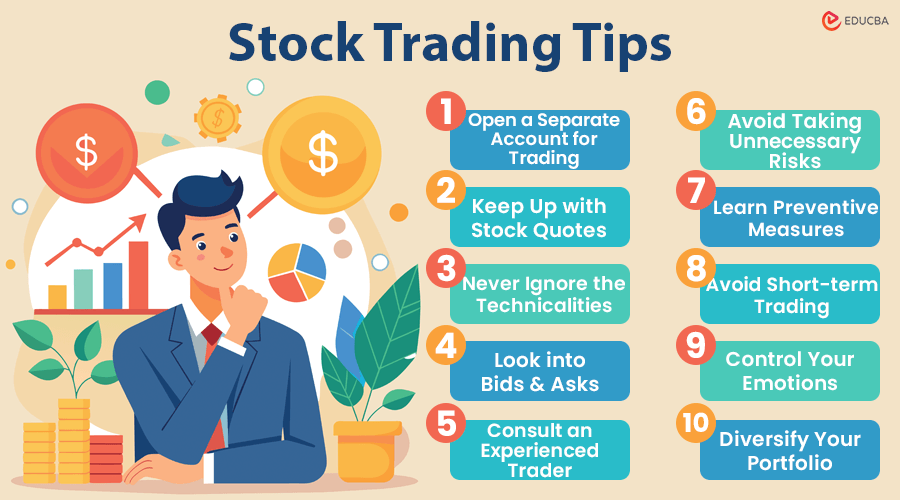Stock Trading Tips – Overview
Stock trading is a high-stakes game where fortunes are made and lost in the blink of an eye. However, it can be rewarding with the right approach and mindset. If you are new to trading or a seasoned pro, these stock trading tips can guide you through the intricacies of stock trading with confidence and simplicity.
Understanding the Stock Markets
Before we begin, let’s have a look at the markets first. We will be looking into two kinds of markets, i.e., primary and secondary.
| Basis | Primary Market | Secondary Market |
| Definition | A market where transactions occur directly between companies and buyers. | A market where buying and selling of previously issued securities occurs. |
| Purpose | Companies issue new securities and offer them to potential buyers. | Trading of existing securities between buyers and sellers. |
| Participants | Companies issuing securities and potential buyers. | Buyers, sellers, brokers, and stock exchanges. |
| Transaction Type | Companies sell new securities to buyers. | Buyers purchase securities from sellers. |
| Involvement | Companies are directly involved in issuing securities to buyers. | Brokers or stock exchanges act as intermediaries facilitating transactions between buyers and sellers. |
Essential Stock Trading Tips
Let’s get into the details now that you know about the markets. The following are some essential stock trading tips that will work effectively for all beginners.
1. Open a Separate Account for Trading
Before you begin trading in the stocks, you will need a demat account, separate from your regular bank account. This account functions like a digital wallet for holding your shares. Opening one is mandatory for stock trading.
2. Keep Up with Stock Quotes
Stock prices fluctuate due to market demand, supply, trader sentiment, company performance, and economic conditions. Staying informed about these factors helps decide when to enter or exit the market. For instance, if you’re looking to invest in the semiconductor industry, keeping a close watch on Taiwan semiconductor stock can provide valuable insights. As a key player in this niche, its performance often reflects broader trends in the semiconductor industry, making it a must-watch for any savvy trader. Consider referring to trading ebooks for comprehensive knowledge from the comfort of your home.
3. Never Ignore the Technicalities
Understanding both the fundamentals and technical aspects of stocks is crucial. Analyzing a stock’s intrinsic strength involves examining its financial details, such as assets, liabilities, expenses, and earnings. This technical analysis aids in predicting a stock’s future potential and making smart investment choices. You can do this using online tools like Yahoo Finance, Google Finance, Reuters, etc.
4. Look into Bids and Asks
In the stock market, bids represent the buying price offered by buyers, while asks indicate the selling price set by sellers. Understanding these terms, deciding on the appropriate bid, and asking prices when buying or selling stocks are essential.
5. Consult an Experienced Trader
The stock market’s unpredictability is widely acknowledged. Many assert that accurately predicting stock and market performance is nearly impossible. Nonetheless, as you gain experience, your analytical skills sharpen, enhancing your ability to make more accurate predictions. Therefore, seeking advice from a seasoned trader or expert before making investment decisions, particularly for newcomers, is prudent. Their insights can assist in predicting stock movements and offering essential guidance, offering a valuable starting point for novices.
6. Avoid Taking Unnecessary Risks
Trading involves inherent risks, especially for beginners. To safeguard your confidence and investment, refrain from taking unnecessary risks. Focus on stable stocks rather than volatile ones, which tend to sustain performance even during market downturns.
7. Learn Preventive Measures
Volatility is inevitable in the stock market, affecting traders of all levels. To protect your capital, learning preventive measures like setting stop-loss prices is crucial. Knowing when to stop trading can help prevent significant losses and preserve your investment capital. keep yourself updated about the market and the trending stocks which help you make well-informed investment decisions.
8. Avoid Short-term Trading
Short-term trading can be tempting, especially with the chance to make quick profits. However, investing in it usually means taking on more risks and demands a thorough grasp of market patterns, technical analysis, and managing risks. Experts often advise beginners to focus on long-term investment strategies since they typically offer more stability and are less affected by market fluctuations.
9. Control Your Emotions
When trading, it is essential to manage emotions like fear and greed to avoid making impulsive decisions that could result in losses. Adhering to a carefully crafted trading strategy is paramount. This involves setting realistic goals, maintaining discipline, and avoiding knee-jerk reactions to market fluctuations.
10. Diversify Your Portfolio
Spreading out your investments across various types of assets, industries, and regions is crucial for reducing risk in stock trading. By diversifying, you minimize the impact of any one investment’s poor performance on your overall portfolio, which can help protect against market declines and lead to steadier returns in the long run.
Final Thoughts
Investing in stocks can be profitable and attract many full-time traders worldwide. However, it is essential to understand that trading involves risks for everyone, regardless of experience. Even seasoned traders face the unpredictability of the stock market. Despite the uncertainty, learning stock trading tips and seeking guidance from experts like analysts or experienced traders can help you make informed decisions. Happy trading!
Recommended Articles
Explore more insights into stock trading tips and techniques to enhance your investment journey. Check out our articles for a comprehensive understanding of the stock market dynamics.



